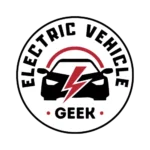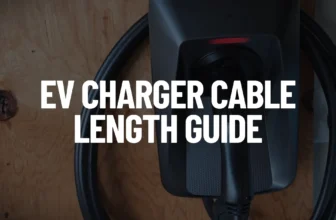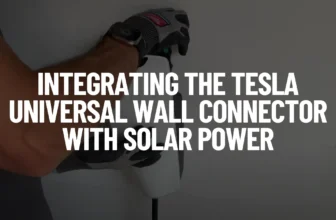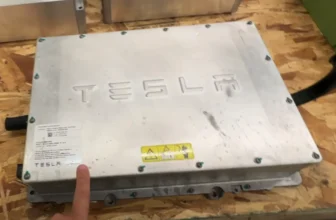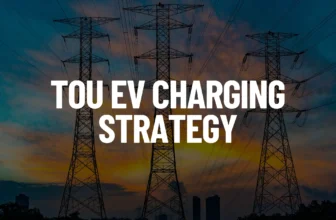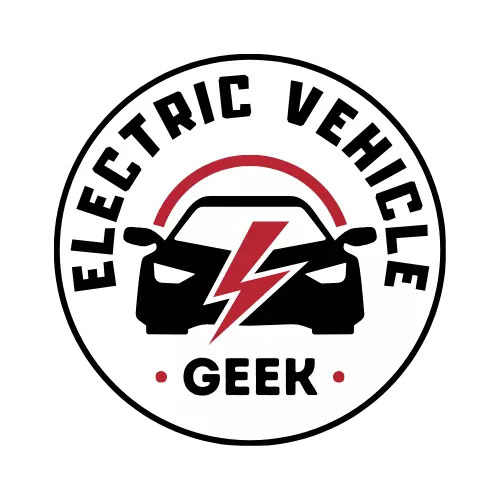22kW charger offers fast charging compared to other Level 2 EV chargers, they are the fastest Level 2 EV chargers that can be installed in residential properties, however, they require a three-phase 400V electrical system.
The vast majority of Americans are on a 120/240V single-phase electrical system which is ideal for Level 1 EV chargers (1.3kW – 2.4kW) and Level 2 EV chargers (3.7kw – 11kW), to install 22kW EV charger they would need to convert their electrical system to a three-phase system that supports 400V.
Power conversion to three-phased 400V is possible, for installation of a 22kW in American residential homes, but is the process and the charger worth it?
This guide explains what a 22kW home EV charger is, the processes and costs of installing the 22kW EV charger where an existing 120/240V electrical system already exists, and whether the process is worth it.
Table of Contents
What Is the Specification of a 22kW EV Charger?
A 22kW EV charger offers an output of 22kW and uses a three-phased 400 voltage, it also uses a 32 Amps current, and since they are type 2 EV chargers they spot a Type 2 (Mennekes) connector, most of them use Open Charge Point Protocol (OCPP) for communication with charging networks and offer advanced safety and smart features.
How Fast Is a 22kW EV Charger?
The key difference between a 22kW EV charger and other level 2 EV chargers of the rate at which they charge the battery, a 22kW EV charger charges an EV battery at 22 kilowatts per hour, while the slowest level 2 EV charger (3.7kW) charges an EV battery at 3.7 kilowatts per hour.
Common Level 2 EV chargers that we recommend and are compatible with 120/240V American electrical systems include 7kW EV chargers which charge at 7 kilowatts per hour and 11kW EV chargers which charge at 11 kilowatts per hour.
To understand the speed difference between the various Level 2 EV chargers for home EV charger installations, we charged an average Lithium-ion battery capacity of 40kWh with various Level 2 EV chargers’ power ratings available for home installations and developed this speed comparison table for you.
| Level 2 Charger Power Rating (kW) | Charging Time (Hours) |
|---|---|
| 3.7kW | 11 hours |
| 7kW | 6 hours |
| 11kW | 4 hours |
| 22kW | 2 hours |
A 22kW EV charger is significantly faster than lower capacity options: it charges five times faster than a 3.7kW EV charger, three times faster than a 7kW EV charger, and twice as fast as an 11kW EV charger.
Does a 22 kW Charger Need 3 Phase?
To install a 22kW EV charger you will need a three-phase electrical supply in your home that delivers up to 400V, most American homes are supplied with a 120/240V electrical supply which makes most homes unable to support the power requirements of a 22kW EV charger.
Single-Phase Level 2 EV Charger Installation – US -NEC
The diagram below shows an electric vehicle branch circuit of a single-phase power supply common in most American residential properties EV charger installations that supports Level 1 EV chargers and 3.7kW to 11kW Level 2 EV chargers.
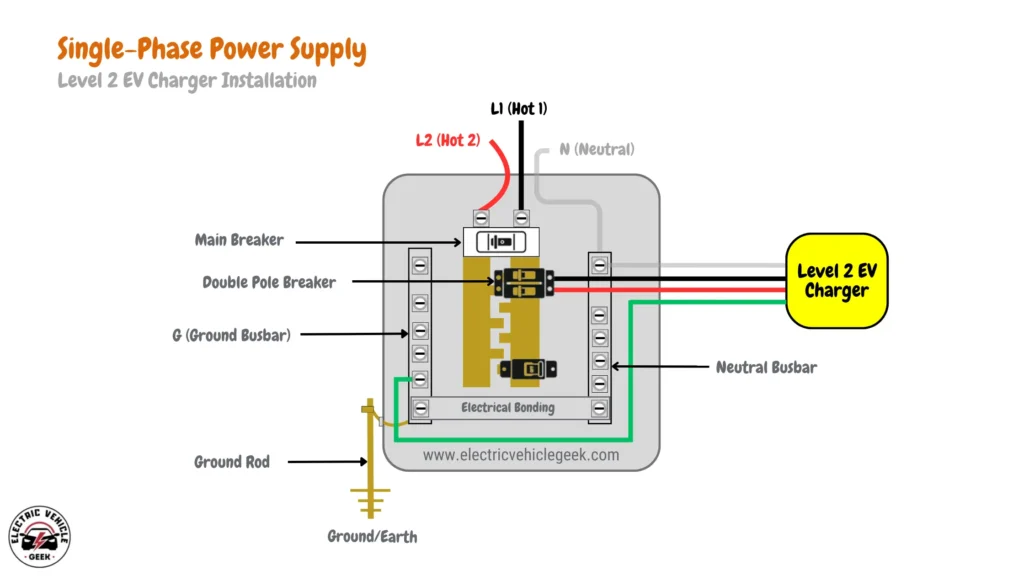
Three-Phase Level 2 EV Charger Installation – US -NEC
The diagram below shows a three-phase power supply electric vehicle branch circuit required for 22kW Level 2 EV charger installations.
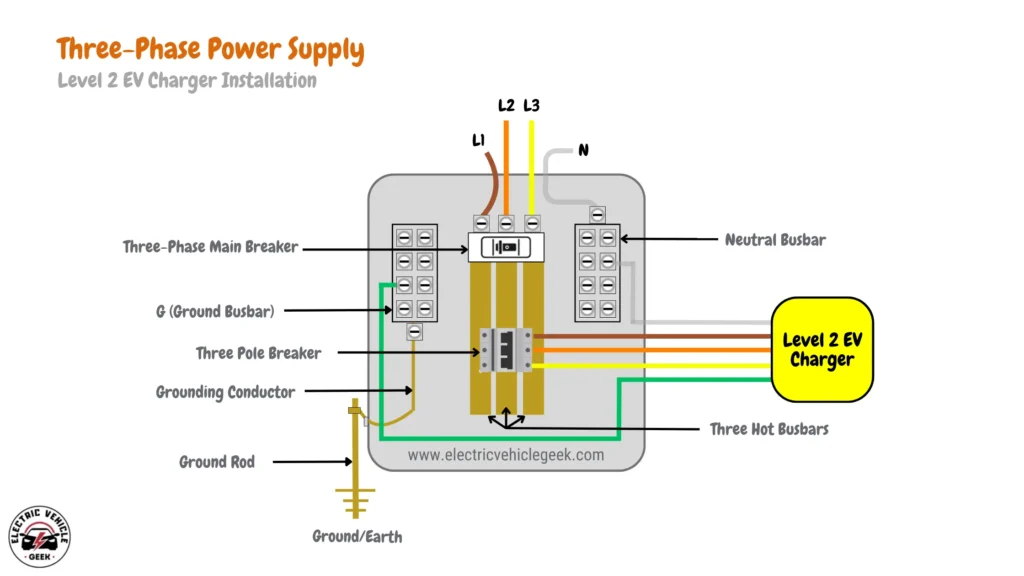
As you can see from the two wiring diagrams above, the main difference is the main electrical power supply cables, the electrical panel busbars, the type of circuit breaker used and the number of feeder wires from the three-pole circuit breaker to the EV charger. The wire colors are also different as shown in the two images.
Can I Install Three-Phase at Home?
Yes, a residential electrician can upgrade your power supply from single-phase power to three-phase power by upgrading your home electrical supply infrastructure. A three-phase power supply is more advanced and powers high electrical loads by utilizing three alternating currents with phase angles separated and sharing a common neutral leg.
3 Phase Power Installation Cost
Upgrading from single-phase to three-phase service currently costs between $7 to $10 per linear foot, starting from the nearest existing three-phase power line in the neighborhood.
Is It Worth Getting a 22kW EV Charger?
Yes, it’s worth it to get a 22kW EV charger, if you have a compatible electric vehicle and a three-phase power supply that can handle the load requirements of a 22kW EV charger. It’s important to note that 22kW EV chargers are more expensive to purchase and install compared to other level 2 EV chargers due to the complexity of the installation processes, however after installation, the speed to charge your electric vehicle with a 22kW EV charger will be 2-5 times faster compared to other level 2 EV chargers.

James Ndungu is a certified EV charger installer with over five years of experience in EVSE selection, permitting, and installation. He holds advanced credentials, including certification from the Electric Vehicle Infrastructure Training Program (EVITP) and specialized training in EV charging equipment and installation, as well as diplomas in EV Technology and Engineering Fundamentals of EVs. Since 2021, James has tested dozens of EV chargers and accessories, sharing expert insights into the latest EV charging technologies.
